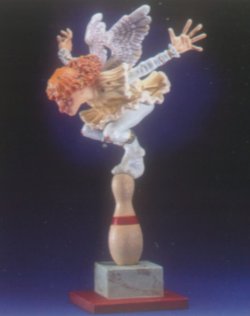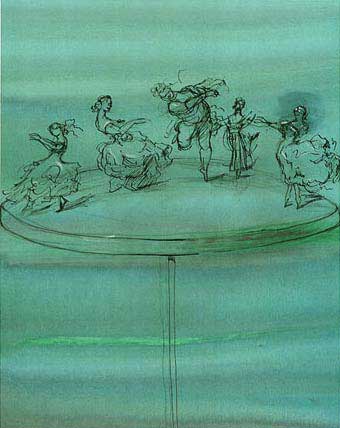
One angel dancing on the head
of a "pin". (Artist unknown.)

The "Scholastics" were medieval philosophers of the Roman Catholic Church who were struggling to try to make sense out of the world within the dogmatic constraints imposed by their religion. A very tough job! They included people such as John Duns Scotus, WILLIAM OF OCKHAM, and THOMAS AQUINAS.
The disputes they entered into often seem like pedantic hairsplitting, futile word games, or even downright incomprehensible nonsense to most everyone today. Scholasticism thus has a deservedly "bad name", and has been continuously and justly ridiculed ever since Rabelais first did so in the 1500's.
One of the favorite things to ridicule is the supposed debate among the Scholastics on the question of "How many angels can dance on the head of a pin?". Apparently, however, none of them put things in exactly these terms, as those concerned to rescue the reputations of Aquinas and the others are anxious to emphasize. The Scholastics could have very reasonably focused on this funny question, however, for it does concentrate several of their points of dispute, including whether "angels" have a corporeal (bodily) or merely spiritual existence.
And in fact, some of the Scholastics, such as Aquinas, did dance quite close to the precise question, as this little taste from his "Summa Theologiae" shows:
| |
Q. 52, a. 3 - "Whether Several Angels Can Be At The Same Time In the Same Place? There are not two angels in the same place. The reason for this is because it is impossible for two complete causes to be immediately the causes of one and the same thing. This is evident in every class of causes. For there is one proximate form of one thing, and there is one proximate mover, although there may be several remote movers. Nor can it be objected that several individuals may row a boat, since no one of them is a perfect mover, because no one man's strength is sufficient for moving the boat; the fact is rather that all together are as one mover, in so far as their united powers all combine in producing the one movement. Hence, since the angel is said to be in one place by the fact that his power touches the place immediately by way of a perfect container, as was said (Q. 52, a. 1) there can be but one angel in one place." |
|
He goes on, but that is quite enough for us. Gadzooks! How would you like to have to read through all the thousands of pages that the Scholastics produced with that sort of baloney?!
So Aquinas' answer is presumably that just one angel may dance on the head of a pin at one time—unless a pin head is considered to be a big enough location to encompass many "places". William of Ockham [or Occam], like Aquinas, argued against the corporeal (material) existence of angels. But, as far as I know, he did not put forward any argument like the above about the sanctity of individual places. I rather think he would have supposed that an infinite number of angels might dance simultaneously on a pin head!
Sara Kreindler, of Oxford, England, sent me this marvelous little ditty that she wrote some time ago:
